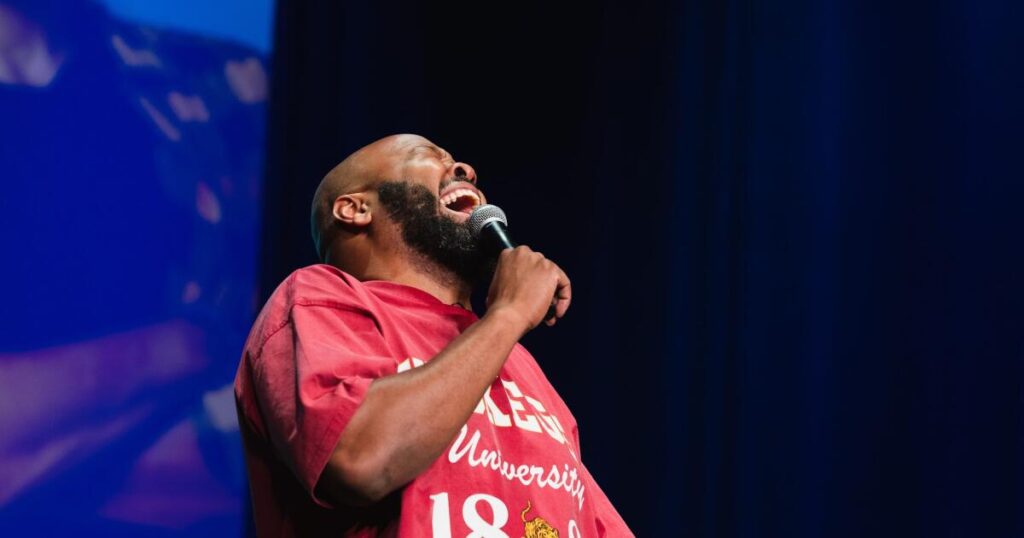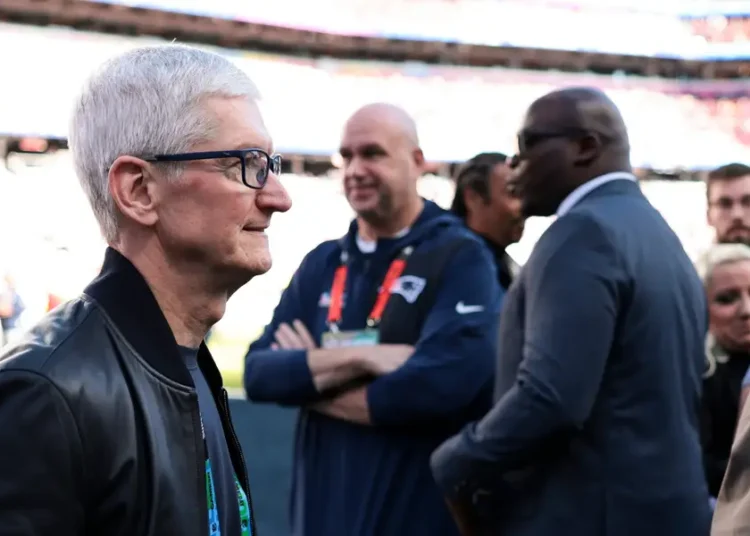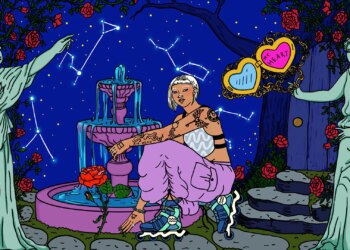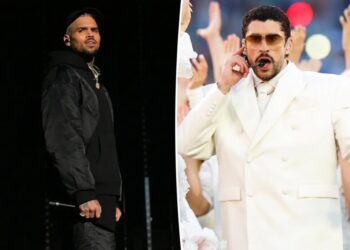There was a time when KevOnStage was a very literal description of comedian Kevin Fredericks as a hungry comedian looking for stage time. These days, he might as well be called KevOnEverything. You can find him cracking jokes on live comedy tours, TV sketch shows, books, podcasts and just about every social media platform you care about. From books like his 2025 New York Times bestseller “Successful Failure” to his latest podcast, “Not My Best Moment,” the idea has always been about forward momentum to breed a funny brand that, just like his name, continues to stick with a sense of humor that ultimately succeeds at being relatable.
Moving from Washington state to L.A. with his wife and kids to fulfill his comedy dreams, he focused his comedy on the Black church and family life in a way that hadn’t been done before. The result was his breakout success with the show “Churchy” that started as a self-funded series that was picked up by BET and recently ran through its second season. It created a lane for him to expand his content universe with sketch shows like “The Hospital” and “Safe Space” on Tubi that allows him to retain creative control and put on more comedians working with veteran stand-ups like Tahir Moore and Tony Baker. The latter is his podcasting partner in crime whom he’s been touring with on the Bald Brothers comedy tour which wraps up in L.A. at the Wiltern on Sunday. Recently we spoke to KevOnStage about the secret to building his comedy brand — by being everywhere.
This interview was edited for length and clarity.
I love that this is a year where so much is happening for you from so many angles.
It’s wild.
You’re KevOnStage, KevOnPodcasts, KevOnBooks, KevOnTV …
[Laughs] Literally KevOnEverything.
When did you decide to go from being Kevin Fredericks — working a regular job and doing comedy on the side — to becoming “KevOnStage”?
I was working at the Spanaway [Washington] branch of Key Bank and I was on Twitter. This must have been 2009 — very early on Twitter. And people were just making jokes and people were getting fired [from their jobs over their jokes on Twitter]. People would not like a joke you said, search your name, Google you, find out where you worked and email like your boss, and people were getting fired. And I was like, “I can’t afford to lose my job over some ports take.” So I’m gonna take my full actual government name out of my handle, which was just Kevin Fredericks at the time. And I was like, “I’m Kev and I be on stage.” And that was literally as much thought as I put into it. I was just not trying to be easily found and fired. So I switched my handle to KevOnStage because I was doing stand-up all the time at that time and it stuck. Hindsight being 20/20, I would have just kept Kevin Fredericks, which was my Facebook name, but I think KevOnStage is cool as a moniker. I’m trying to be like Beyoncé, Bono, Sting, Oprah, KevOnStage — one name. People think my actual name is Kevon because of that. If they think that, then I know they found me because of the internet. Which is also fine. As long as people know me, it doesn’t bother me.
When did you really find your tribe of comedians in Washington state that you still hang out with today?
In Washington state there was only really like Nate Jackson, he was the only working comedian who was working nationally. In Washington it was me, Nate, Big Irish Jay, a comedian named Terrence — those are the only people that were kind of doing comedy consistently. And then we had the Bay Area Black Comedy Competition, I don’t remember what year it was, and I met Lance Woods, who I’m still cool with. But then when I moved [to L.A.], that’s when I met Tony Baker and Tahir Moore through All Def Comedy. Because I didn’t really do stand-up on stage that much when I first moved to L.A. My wife was like, “we’re not gonna move to L.A. and then you’re on stage four or five nights a week.” And it was hard to get on stage … you have to go and hang out, go to Denny’s and like hang out all night. And [my wife] was not going for it and I had small children who had to go to school. So the majority of the people that I know I met through All Def.
You brought up an interesting point about the lifestyle of comics because it is a lifestyle that doesn’t really agree with everything else for most of the 9-to-5 working world — especially being married and having kids. So how did you then decide to focus more on content creation as a means to perform?
Well, interestingly enough, it started before I moved to L.A. There’s hardly any entertainment opportunities in Washington. There’s very rarely a TV show, even shooting there, much less a show you can actually audition and be on. So what happened was we were doing plays. We’re trying to be like Tyler Perry, David E. Talbert or Je’Caryous Johnson. And we were on our way, but there weren’t enough people in Washington to mount a successful black play — or “urban plays” as people called them. So we did our best, but even if we got 3,000 people, that was only for one night. And we weren’t doing that, by the way. We’re getting like 68 people. So I was watching a lot of YouTube at the time and I was realizing these people have fans everywhere. So I was like, we can do internet comedy and make people laugh on the internet and hopefully we get fans all across the United States. And from the first two videos we did, I was like, forget the play thing, I think the internet is the thing. Just like focus on that. I think we do that, we will build our own audience, and everything will be easier for us.
As far as the ability to own your content and guide however you want, how has that been important for your comedy career?
For me it’s been like, “He who pays says.” Like if you pay for it, you get the final say. So for a long time, it was by default because nobody’s getting paid. I’m just making it and posting it. The first big thing we did that was like really expensive was “Churchy” [on BET]. And there was a lot of [money from previous brand deals] that I saved, a lot of [money from doing] Spectrum commercials that I saved. I made eight episodes of “Churchy.” And shout-out to Jamal Henderson, he helped us meet executives at BET and they bought it. And they couldn’t have any creative control because it was already done.
So that’s kind of a process that we’ve repeated with [my sketch shows] “The Hospital” and “Safe Space.” We pay for it and then license it or partner with a company and make it now. And with Tubi, they’re a little bit different. They let you have creative control, even if they pay for it. They’re like “hey, we trust that you built your audience, you know your audience.” They’re the only platform that I’ve worked with that’s completely like, “we don’t have any say-so, no notes, you don’t have to send us a script, you don’t have to send an edit for approval, we trust you.” And that’s fantastic for me because you get to make it as close to [the original vision] without any impurities as possible.
Now I gotta be honest, when I work with BET, we had amazing executives and they’ve given us a lot of great notes, but they also give you some notes that you don’t agree with that you have to take. And that’s also part of just making things. It’s not a full negative. They also made [the show] better in a lot of different ways. And the one thing that I’m very grateful for with our partners at BET is every note they gave was to make the overall project better and for more people to enjoy it. I am a comedian at heart, so sometimes I’m loyal to the joke to a fault. The executive is like, we gotta tell the best story — so it’s not all bad. A lot of times we hear people bemoan partnering with people, and it has its negatives, but also my TV exec was more experienced than I was at making good TV, so some of their notes were really helpful, and I can carry those with me when I’m making other projects.
“The Hospital” and “Safe Space” are both like sketch shows. What was important about the formats for both shows — one at a hospital, the other on a therapist’s couch — that allow you to find the funny?
Richard Washington, who is a creative exec at KevOn Stage Studios, head of T V and film, and I built the systems and then we allow the people to work within the systems to the best of their personality. So I think the great part about “Safe Space” is the talent. Like you give them a premise, you find the right people, and then they take it and make it funny. “Safe Space” was really the same with “The Hospital.” Like, you know, we hired more sketch writers for the hospital, but Safe Space was more improv than even “The Hospital.” We had some fully written sketches for “The Hospital,” but we didn’t stick to everything exactly. Some are almost all improv. Like comedian CP’s episodes, he’s just riffing. So it’s as close to a stand-up version of content as you can get. And what I mean by stand-up is the audience is sitting there not knowing what the person’s gonna say. And that’s why I think it works.
As a creator of these shows, you often hold the door open for new talent to shine. How does that help your own vision of allowing there to be space for new actors and comedians to come up?
I grew up playing sports and then I went into plays. And with both of those elements, it’s it’s a team environment. You need other people to be successful and you gotta rely on other people to do their thing. With plays, you wanna have the best show possible. And then you put it all together and it’s the best product. And I think that’s the same approach that I take to creation. A lot of comedians, I’ve been told, they won’t take the best comedians. They’ll take people who are OK, but nowhere near as good as them.
Considering you post three to five videos a day, how do you find the time to produce as much content as you do?
So the thing is like this is my job. And I work really hard. I think people compare themselves to me, but they also have a job. Like you’re thinking of “how does he do this?” because you’re thinking of your actual day job. For the most part, I get up and think of funny things to say all day. And the other thing is I don’t spend a lot of time thinking about what I’m gonna do or editing it at all. If something funny happens right now, if I walk out of here and I trip and fall, I’ll probably make a video immediately and within five minutes that video’s gonna be on seven different platforms. So I’m not really precious about what I make. And I feel like people think it’s hard, but this is not hard for me. It’s something I love to do, I create freely out of joy. The guy who runs my doughnut shop who hasn’t taken a day off in 20 years, literally I was talking to him about this. He never takes a day off. Twenty years he’s at that doughnut shop, every night at 8 p.m., he makes doughnut, preparing for the day. Every day at 4 a.m., he comes and bakes them. That is hard. Not to say what I’m making is not hard. It is, but it’s not hard like that. People have hard jobs. I just be silly for two minutes and post it within five minutes. That’s not really hard for me.
I guess you’re not getting cellphone calluses.
Not at all [laughs] … I kind of designed my content to be able to make it easily because I feel like my approach is just inundating you with Kev. Like I want to be unavoidable. Yeah. I want to make content on so many different topics. It’s not even always comedic. I want people to just share you and or have a thought or make you have a thought. Right now I’ve been doing a lot of podcasts. So if you don’t follow me, but you follow for example “The Pivot,” which I did last week and they collab with me, now you’re seeing me on “The Pivot” or Funny Marco or I interviewed Issa Rae for the first episode of [my new podcast] called “Not My Best Moment.” And Issa Rae doesn’t do a whole whole bunch of interviews if she’s not promoting something. So if you’re interested in what Issa has to say, you got to hear me because I asked the question. So people rip my stuff, I’m like, “this is great!” They rip it and post it on threads. This is like as close to getting bootlegged as possible.
That’s what you want.
Yeah, bootleg me! Obviously I’d love to make the money, but it’s like the exposure will become capital or currency later. I just want to be out here so much that you’re eventually like, “All right, what is he talking about?” Because think about how many videos do you see in a day now. Back in the day, we used to have to be like, OK, I want to watch the videos. I’m gonna go to my computer and go to like, I remember before YouTube, I used to go to Break.com and watch videos. It was a thing I did for some time and then I went on about my day. Think about how many videos you consume on a daily basis. … So you gotta really hit ‘em over and over before they make a decision. So that’s why I just wanna flood you. I want you to be like, “Oh, my God, enough!”
Well, add one more to the pile right here.
Yeah, absolutely. Once I saw cameras here [at the L.A. Times studio], I was like, “Yeah, baby, I thought this was just an interview, we got video content, baby. Let’s go!” So yeah, it’s like that’s my approach. Just keep going — a lot.
The post Key comedy advice from KevOnStage: Don’t just be funny, be ‘unavoidable’ appeared first on Los Angeles Times.




